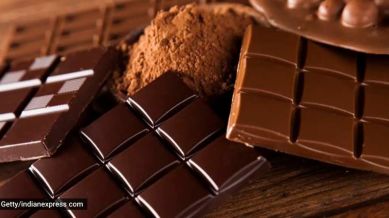How bite-sized snacks can raise your blood sugar: Mini chocolate bar has more sugar than cocoa, bhujia is bad fat, refined flour
Understand how these tempting pouch indulgences are laden with unhealthy fats, sugar, refined flour and additives

How many of us pick up a mini chocolate bar or a 30 gm pack of bhujia for an in-between snack, thinking that the pocket-sized indulgence won’t affect our blood sugar levels? What you do not know is they contain high amounts of sugar, are made with the cheapest refined flour available along with vegetable and palm oils. All of these load you with unwanted calories.
High sugar: Let’s take up mini chocolate bars. A 12 gram branded mini bar contains 64 calories. A 19 gram variant contains 100 calories. So a serving of mini chocolate bar packs a substantial amount of sugar, which is a significant portion of the daily recommended limit for added sugars.
monthly limit of free stories.
with an Express account.
To make chocolate affordable, manufacturers often add more sugar as it’s a cheaper ingredient than high-quality cocoa butter. A lower percentage of cocoa solids means less of the naturally bitter flavour and more space for added sugar. Some inexpensive chocolates may also contain additional fillers or additives. Frequent consumption of such sugary bites can cause rapid spikes in blood glucose levels, leading to insulin resistance, a condition when the cells stop reacting well to the sugar-regulating hormone over time.
Palm Oil and Unhealthy Fats: Palm oil is another common ingredient in these snacks. While it adds flavour and texture, it has been linked to increased levels of low-density lipoprotein (LDL) and can contribute to cardiovascular issues. The presence of unhealthy fats, including trans fats that are found in many processed snacks, exacerbates the risk of developing metabolic syndrome — a cluster of conditions that include high blood pressure (130/80 mmHg or higher) fasting blood sugar of 100 mg/dL or higher, serum triglyceride levels of 150 mg/dL or higher, high density lipoprotein or HDL cholesterol levels of less than 40 mg/dL for men and less than 50 mg/dL for women and a waistline of 40 inches or larger for men and 35 inches or larger for women.
Refined flour: Refined carbohydrates present in snacks like bhujia and chips are also problematic. These have a high glycaemic index, meaning they can lead to sharp increases in blood sugar levels post-consumption. This not only disrupts blood sugar stability but also encourages overeating due to the lack of satiety often associated with processed snacks.
A small (30 gram) serving of bhujia can contain between 174–184 calories. Deep-frying adds significant amounts of unhealthy fats to bhujia, which can raise LDL when consumed regularly.
Most commercially available bhujia packs contain a large amount of salt, which can raise your blood pressure. Despite its calorie density, bhujia lacks vitamins, minerals and fibre, making it an “empty calorie” food.
Artificial flavourings: These imitate natural flavours but may contain neurotoxins and carcinogens. Artificial flavour enhancers like monosodium glutamate (MSG) can cause allergic reactions and potentially lead to increased blood sugar levels and insulin resistance.
Preservatives like butylated hydroxyanisole (BHA) and tert-butyl-hydroquinone (TBHQ) help extend shelf life. But they are associated with thyroid damage, metabolic and growth disorders, nerve disease, and cancer risk as seen in studies.
(Dr Chaturvedi is endocrinologist, Indraprastha Apollo Hospital, New Delhi)